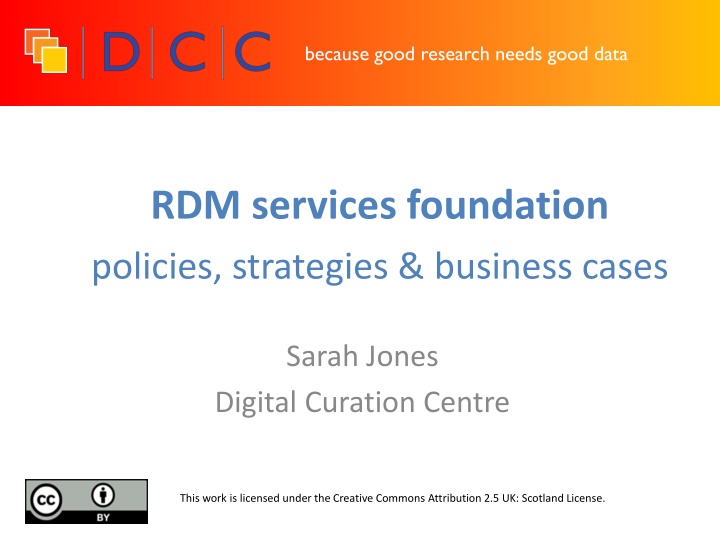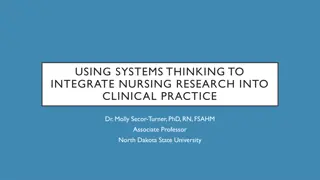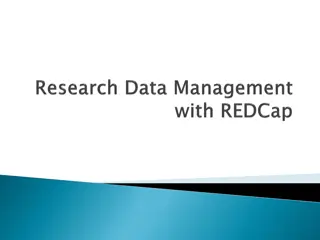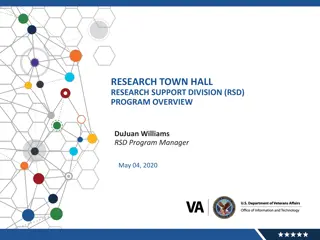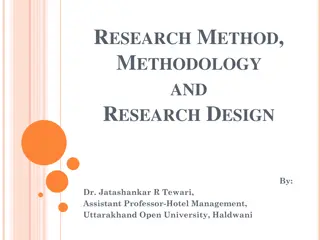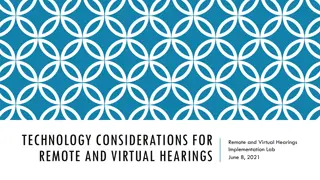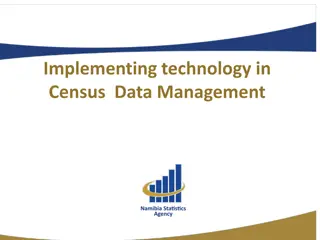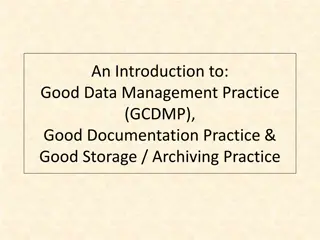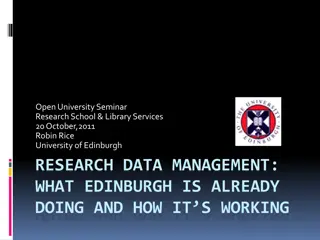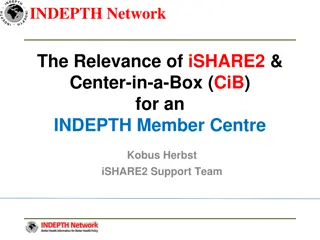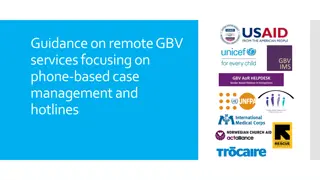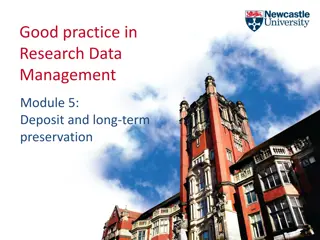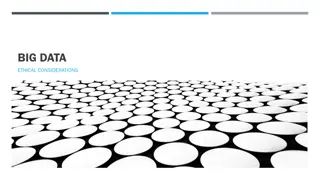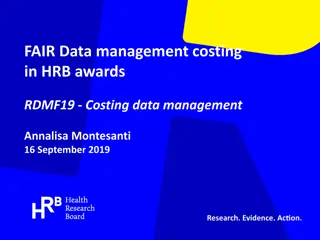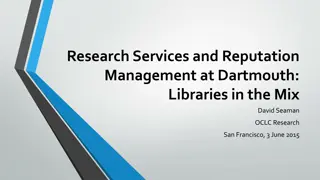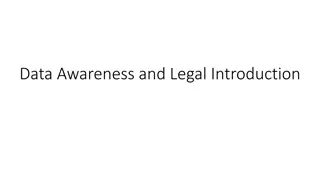Essential Considerations for Implementing Research Data Management Services
Research data management services are vital for facilitating good research practices. This includes developing RDM policies, strategies, and business cases, along with providing necessary services such as data management planning, active data management, preservation, and training. Starting with a clear policy, understanding external drivers like open data initiatives, and addressing policy trends can help institutions effectively manage research data. Examples from universities like Leeds and Oxford showcase the importance of well-defined RDM policies for ensuring the quality and accessibility of research data.
Download Presentation

Please find below an Image/Link to download the presentation.
The content on the website is provided AS IS for your information and personal use only. It may not be sold, licensed, or shared on other websites without obtaining consent from the author.If you encounter any issues during the download, it is possible that the publisher has removed the file from their server.
You are allowed to download the files provided on this website for personal or commercial use, subject to the condition that they are used lawfully. All files are the property of their respective owners.
The content on the website is provided AS IS for your information and personal use only. It may not be sold, licensed, or shared on other websites without obtaining consent from the author.
E N D
Presentation Transcript
because good research needs good data RDM services foundation policies, strategies & business cases Sarah Jones Digital Curation Centre This work is licensed under the Creative Commons Attribution 2.5 UK: Scotland License.
What RDM services might be needed? Business plans and sustainability RDM policy and strategy Data management planning Active data management Discovery Appraisal and risk assessment Access and publishing Preservation Advisoryservices Training
Where to start? Policy sets service scope and can unlock funds Important elements Clearly stated coverage and requirements Well defined roles and responsibilities Research data definition Institutional policy should reflect the external context
External context and drivers data are a public good and should be openly available Open Research Data pilot G8 Science Ministers Statement FAIR data principles For science to effectively function, and for society to reap the full benefits from scientific endeavours, it is crucial that science data be made open
Data policy trends Proliferation of policies Make the landscape easier for researchers to navigate More harmonisation needed Clarifications needed when requirements conflict Growth in open data policies Should push open science agenda but not at expense of RDM Research data policies often aspirational and high-level Need for more group guidelines and practical procedures More researcher input when developing services & infrastructure
Early UK research data policies legal tone / language a section in uni DM policy useful guide as appendix Statement of commitment Infrastructure policy 10 commandments mutual promises aspirational Based on Edin. with a few additions Baseline of RCUK Code + procedures & support
Three examples (for exercise) University of Leeds RDM policy https://library.leeds.ac.uk/research-data-policies University of Oxford policy on the management of research data and records http://researchdata.ox.ac.uk/university-of-oxford-policy-on-the- management-of-research-data-and-records UCL research data policy https://www.ucl.ac.uk/isd/services/research- it/documents/uclresearchdatapolicy.pdf
UK policy examples www.dcc.ac.uk/resources/policy-and-legal/institutional-data-policies
Analysis of what policies cover Laurence Horton did an analysis of the 31 policies listed in 2014 74% specify a requirement for data to be open where possible 74% of unis require a DMP and a further 19% point to funder requirements. Only 2 don t mention DMPs at all. 55% specify a length of time for which data should be retained / preserved 45% give a full definition of research data Only 23% contain a statement on institutional ownership of research data Again, only 23% (7 out of 31) mention RDM costs Horton, L and DCC (2014) 'Overview of UK Institution RDM Policies', Digital Curation Centre. Available at: www.dcc.ac.uk/resources/policy-and-legal/institutional-data-policies
Guides on policy development Guidance to help institutions get started: Five steps to developing a research data policy www.dcc.ac.uk/resources/policy-and-legal/five-steps-developing-research-data-policy LEARN project guidelines for developing an RDM policy http://blogs.ucl.ac.uk/learn-project/files/2016/01/red_LEARN_ Elements_of_the_Content_of_a_RDM_Policy.pdf ANDS Data Management Policy outline http://www.ands.org.au/datamanagement/policy.html
A policy is just the beginning... Image of spring begins CC-BY-SA by Kat NLM www.flickr.com/photos/orangegreenblue/8634903838
Making the case for RDM What will persuade people to invest? compliance, potential research benefit, being innovator / leader What level of detail is needed? Who is the right person to sign off? Provide options to give panel more choice to approve www.dcc.ac.uk/resources/briefing-papers/making-case-rdm
How to deliver and sustain services? DIY or outsource? Cost models Prevailing institutional culture Part of core institutional provision (overheads) Access to developers / technical expertise Direct costs for research facilities / services Possibility for brokered deals, procurement support, regional collaborations... Charges on research grants e.g. deposit fees Choice that keeps options open e.g. OS + delivery options Grant funding for certain services https://unlockingresearch.blog.lib. cam.ac.uk/?p=631
Establish a working group Good mix of representatives from operational units Senior management leadership http://www.executive-coaching-services.co.uk/executive-coaching/leaders.jpg
Assess institutional context Number of active researchers Aspirations and strategic objectives http://www.drewsmarketingminute.com/images/2014/09/Creating-A-Company-Culture.jpg
Be aware of existing infrastructure http://www.dcc.ac.uk/projects/opd-for-rdm
Capability models ANDS Capability Maturity Model www.ands.org.au/guides/capability-maturity Data Audit Framework https://researchdata.jiscinvolve.org/wp/2016/11/27/finding-researchers- really-really-want-research-data-shared-service Data Curation Profiles http://datacurationprofiles.org
Common survey findings Sharing driven by benefits not policies (e.g. reuse potential, citation, public good etc) Informal, peer-to-peer sharing methods most common - email, dropbox, transfer on USB etc Lots of data held on hard drives and cloud services rather than managed university filestores Lack of clarity on data ownership or processes when staff leave There is a demand for and intention to use uni services, but low uptake in many cases so far
Service development strategy 1. Consider each service element individually 2. Assess your current capability 3. Define your target capability 4. Identify barriers and opportunities
Implementing research data policy Edinburgh RDM roadmap example shows how to break work down into sections and allocate out tasks across divisions www.ed.ac.uk/information-services/ about/strategy-planning/rdm-roadmap
Policy to service (DMPs) Data Management Planning at Edinburgh All new research proposals must include research data management plans or protocols that explicitly address data capture, management, integrity, confidentiality, retention, sharing and publication. Develop a template in DMPonline based on this proposed structure / coverage Training module available on MANTRA Sample plans and advice available from RDM team Consideration of need for Software Management Plans
Policy to service (data storage) Storage services at Edinburgh The University will provide mechanisms and services for storage, backup, registration, deposit and retention of research data assets in support of current and future access, during and after completion of research projects. Provision of baseline 0.5Tb/user via DataStore Support for backup and synchronisation on mobile devices (DataSync) Enhancement of existing data repository (DataShare) and new preservation service (DataVault) Development of a Data Asset Register
Who has what in place? 87% 13% Policy and strategy Business planning 50% Data Mgmt Planning * 38% 40% Data cataloguing Managing active data Governing access & reuse Data preservation 18% 22% 63% Skills training & consultancy % indicating rolling out or embedding * referred to access & storage systems in survey
Thanks for listening! DCC guidance, tools and case studies: www.dcc.ac.uk/resources Follow us on twitter: @digitalcuration and #ukdcc
Comparing policies exercise Read and compare the 3 policies then discuss: Which style best suits your organisation? Is the coverage sufficient? What would you add or remove? What will enable you to transition into service development and implementation?
